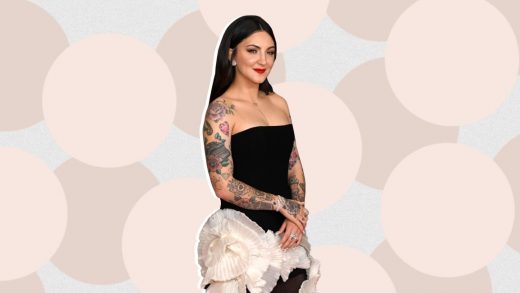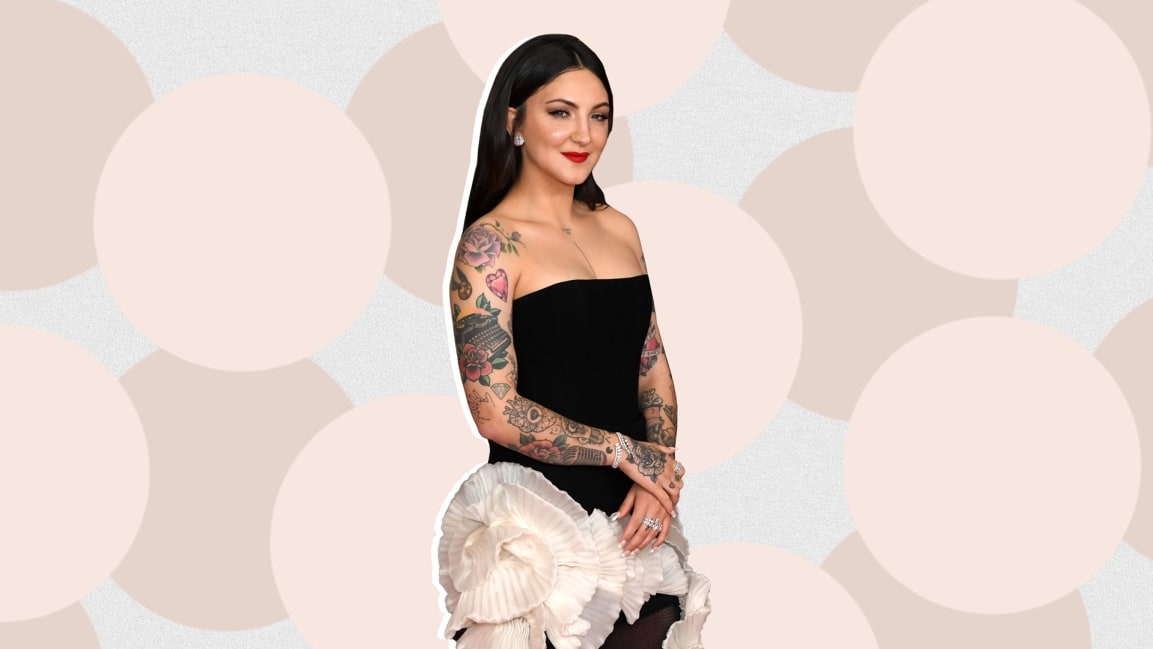How Julia Michaels arrived to pop perfection on her own time
Listen to the latest episode of Fast Company’s Creative Conversation podcast on Apple Podcasts, Spotify, RadioPublic, Google Podcasts, or Stitcher.
Julia Michaels is in rare form—and getting there has been a slow burn worth waiting for.
At 19, Michaels entered the music industry as a songwriter for artists including Justin Bieber (“Sorry”), Selena Gomez (“Bad Liar,” “Hands to Myself,” “Lose You to Love Me”), Hailee Steinfeld (“Love Myself”), Fifth Harmony (“Miss Movin’ On”). But she didn’t dare step into the booth herself until she wrote what would become her breakout single, “Issues,” which, according to her, was too personal to give to someone else. “Issues” landed on her 2017 critically acclaimed EP Nervous System. Instead of leveraging that success into an LP, Michaels released two more “mini albums,” Inner Monologue Part 1 and Inner Monologue Part 2, and a smattering of singles and features. Sure, the concept of an “album” is debatable these days, but there is something to be said for how an artist can execute a cohesive project on a grander scale.
It would seem only fitting that Michaels, now 27, is finally at the point of releasing her first full-length album when she is feeling the most fulfilled.
Not in Chronological Order is Michaels’s debut studio album, and it’s evident that she’s fully formed in her craft of storytelling that deftly navigates the anxieties, insecurities, and unabashed joys of life and love.
Check out highlights from the episode of Fast Company‘s podcast Creative Conversation. This conversation has been edited for clarity and length.
Fast Company: In 2017, you had your more public-facing breakout moment with your song “Issues.” You’ve mentioned before that song felt too personal to give to another artist. That said, it’s one thing to hold on to a song, but it’s another thing to actually sing it for yourself. What was it about that point in your career that made you want to step into the spotlight as a singer?
Julia Michaels: [Justin Bieber’s] “Sorry” had gone number one on Billboard, and it was my first Billboard number one. It supposed to be like the best day of my life. This is the pinnacle for songwriters.
I was in a relationship with somebody that was a producer, and he made me feel like absolute garbage for having this success. [He] was so angry, like, “I’m older than you. This should be my thing. I don’t understand how you’ve gotten here first.”
I remember going to the studio, and I was with [producer] Benny Blanco, [songwriting partner] Justin Tranter, and [producers] Stargate, and I was crying. I was so sad. I had “Issues” written down in my phone and I was like, “This could absolutely be the thing that I write about in conjunction with this.” We did [record] that day. Because it was such an intense moment in my life, the thought of having someone else sing that song made me hurt.
Was there anything holding you back from deciding to be an artist in terms of singing? As I understand it, people were trying to get you to be a singer, but you were more like, “I’m cool just being more behind the scenes.” What was holding you back?
I was deeply insecure. I’ve literally never thought of myself as a singer. I’ve always thought of myself as a songwriter, and I just have enough of a tone to let those songs happen.
You have more than enough.
You’re very kind. But I think that was my biggest fear. I learned to sing on the mic in the booth with Auto-Tune, and if I did it wrong, I could do it over and over and over and over again until it was perfect. Then I’m all of a sudden doing my first performance on the Billboard Music Awards, like my second live performance ever. I’m terrified. I’m like, “What if I fuck this up?”
How did you learn to step into your greatness?
I had done a song for somebody, and I was supposed to be featured on it. This was before I was even thinking about being an artist. Because I was on the fence about it, they took me off and put a different artist on it. I remember I was in a session with [my writer partner Justin] Tranter and I went to the bathroom and I started crying. Justin realized I’d been gone for 30 minutes, and he’s like, “I’m just going to go check on her.” He’s like, “Why are you crying?” I was like, “I don’t know. I have no idea.” He’s like, “Well, maybe you’re crying because this is something you have wanted, but you’re too scared to let yourself want it.” I’m sitting on the bathroom floor in a studio—disgusting—having this conversation together in the middle of an artist session, which was very funny. So that was a big moment.
From your first body of work Nervous System to your debut studio album Not in Chronological Order, how would you say you’ve evolved as a singer and a songwriter?
I was 23 when I put out Nervous System. I was still trying to figure out who I was as an artist. Then Inner Monologue came and it was very clear who I was and how I want it to be perceived. I think that’s changed a lot. With time comes different experiences, and I’m in love with someone that understands me [fellow singer/songwriter JP Saxe], that is communicative and waits for me to get there. That’s so important, and I’ve never had that. A lot of my last mini albums and EPs have all been about chaotic love. You think that’s what love is supposed to be because you see it in the movies, you see it in the music videos. It’s just always chaos to make this passionate, beautiful love. I don’t think a lot of people realize that you can have the passionate, beautiful love without all the toxicity. I think that’s what I want to portray with this album.
Say it louder for the people in the back. Obviously, JP is a fantastic musician himself, and I know that he has definitely contributed to this album. What was that process like for you being in the swirl of emotions and having him work on some of the songs?
We figured if the first song we ever wrote together [“If the World Was Ending”] got us a Grammy nomination, we should probably keep writing together!
Not doing bad at all.
I think when you work with someone that you love, it can be a little scary because then you start to take things a little bit personal. But I’m so lucky JP understands my neuroses in the studio, so he doesn’t take it personally. He knows that if I’m being a little bit aggressive or a bit alpha, it’s just because I’m trying to get to an idea. Even if it turns into nothing, he indulges the idea, which I’m very grateful for. It’s been wonderful as of now. I don’t know what it’s going to look like five years from now, but he did do “All Your Exes” with me. He did another song on my album that I love so very much called “Little Did I Know.” It’s been so wonderful. We actually collaborate incredibly well together, and I hope that doesn’t change. I’m knocking on the wood on my table.
Is there a particular song on this album that presented a significant challenge to write or record?
Some songs are definitely harder to write than others, but I’m not the kind of person that will write a song and stew on it. It doesn’t take me a week to write a song. I want it to be able to just subconsciously come, and if it doesn’t, then I’m like, Well, maybe it’s not meant to be today or right now. “That’s the Kind of Woman” is a song on this album where it talks about the woman I wish I could be, which is a big deal for me. I remember I brought it to [songwriter] Michael Pollack and he was like, “I don’t know if this is my place to insert my insecurities and the person I wish I could be, because this is your point of view. This should be yours.” Of course, he helped finesse it with me and make it the way that it is. But we were both crying in the studio and having a really beautiful moment together. That song was hard to write, but it wasn’t a challenge, per se.
I’m very guilty of getting stuck on one thing and just harping on it. What are some lessons in pushing past those mental blocks?
I’m really good at pivoting in a session. If I’m like, “This doesn’t feel good,” then I’ll be like, “You know what, we have this. Let’s try something else.” The point of music is exploring. We’re not robots. We were not expected to do something major every time we walk into a room. That was a big thing for me, too, because I used to have anxiety where people would think that I was like going to shit gold, and the pressure to perform was so scary to me that I’d just completely shut down. It took that realization of like, “Oh, I’m not a robot” to relax and be like, “If we get something amazing, [great]. If not, then we don’t.” That doesn’t mean that we won’t ever again.
Listen to the latest episode of Fast Company’s Creative Conversation podcast on Apple Podcasts, Spotify, RadioPublic, Google Podcasts, or Stitcher.
(74)



